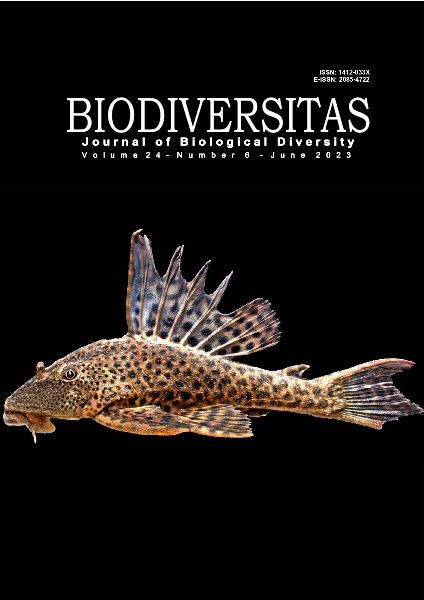Construction of the CRISPR/Cas9 module and genetic transformation of aromatic rice cv. Mentik Wangi for developing bacterial leaf blight resistance
##plugins.themes.bootstrap3.article.main##
Abstract
Abstract. Rifhani NF, Apriana A, Sisharmini A, Santoso TJ, Trijatmiko KR, Slamet-Loedin IH, Yunus A. 2023. Construction of the CRISPR/Cas9 module and genetic transformation of aromatic rice cv. Mentik Wangi for developing bacterial leaf blight resistance. Biodiversitas 24: 3258-3268.Rice cv. Mentik Wangi is a local aromatic rice that is susceptible to pests and diseases, such as bacterial leaf blight (BLB) caused by Xanthomonas oryzae(Xoo). This bacteria can cause damage to plants thereby reducing crop yields. This study aimed to obtain the CRISPR/Cas9 module construct as well as introducing the construct into rice cv. Mentik Wangi for developing BLB resistance. The manufacture of the CRISPR/Cas9 module was carried out using the Golden Gate method, and the introduction of that construct into rice cv. Mentik Wangi was carried out using Agrobacterium tumefaciens. Constructing a CRISPR/Cas9 module with multiple gRNA of OsSWEET11 and OsSWEET14 genes has succeeded, 129 putative transformant lines of T0 generation produced with the regeneration and transformation efficiency values ??are respectively 9.4% and 9.8%. The results showed that 36 lines were positive for the hpt gene, indicating that the CRISPR/Cas9-gRNAOsSWEET module construct was successfully entered into rice cv. Mentik Wangi. Further analysis is needed to identify mutagenesis in the target gene region of TI generation transgenic plants as well as phenotypic tests for BLB resistance.

